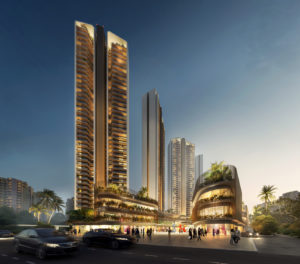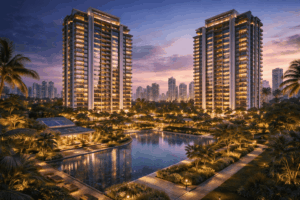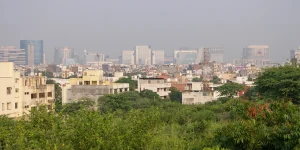The 21st century has witnessed a transcendental change in human society, with the global community surpassing every developmental parameter imaginable. The statement that the real estate industry is the cornerstone upon which this progress is sustained is a veritable fact.
Table of Contents
The developmental trajectory of India is a testament to this affirmation, with the country successfully ascending the international hierarchy of superpowers, becoming the fifth-largest economy in the world. It would be remiss not to acknowledge the instrumental role the infrastructural advancement in the country, courtesy of its booming real estate sector, has played in this journey.
Real Estate: A Key Contributor to Employment and Growth
The real estate industry is the second-largest employer in the country. Therefore, industry experts’ predictions that the industry is projected to grow fourfold in the next two decades augurs quite well for the economy. However, it is essential to recognise the cost of this growth for not only contemporary society but future generations and the environment as well, making sustainable real estate development a crucial priority for the industry.
As per a study conducted by the United Nations, cities which are considered the growth engines of society and are thus the abode of maximum-built structures, are projected to house 68% of the human population by 2050. But only amount to 3% of the planet’s landmass. To further add to this, cities today account for 78% of global energy consumption and are responsible for 60% of greenhouse emissions, thereby exerting tremendous pressure on the delicate fabric of the ecosystem.
In light of these factors, there is an imminent and palpable need for recognition of the importance of adopting green, environmentally-friendly practices to ensure the development of a built environment that is sustainable for the society and environment alike. Cognizant of the importance of sustainable development, real estate development company Ganga Realty envisions transforming the infrastructural panorama of the country by building environment-driven living spaces that are second to none in terms of growth and living experience.
A key component of this vision is the integration of Green Building at the crux of all development plans, a sentiment echoed by the realty’s Executive Director, Mr. Neeraj K. Mishra, in his recent article in the renowned daily, Financial Express. With over 20 plus years of experience in the architecture and construction industry, Mr. Mishra has successfully managed over 70 million sq. ft of sustainable architecture.
Ganga Realty’s Commitment to Green Building Practices
First of all, when we talk about Green Buildings, it is important to fathom it as a holistic concept, inculcating within its expanse numerous facets related to a building’s lifecycle, serving the purpose of increasing its sustainability quotient. To put it simply, Green Buildings refer to built environments that are designed to amplify the positive effects on the environment and mitigate any negative environmental impact that could arise from its development.
This includes but is not limited to a pertinent site selection, usage of durable material, and energy-efficient resources, and diligently thought-out interior designs, all aimed at maintaining or improving the environmental well-being as well as the standards of living of the occupants.
In recent years, the real estate industry in the country has commenced its sustainability odyssey, with the guidance of the Indian Green Building Council (IGBC). Established in 2001 with the goal of building a sustainable built environment in the country by 2025, the organization has been working proactively with multiple governing agencies to promote green concepts pan-nation.
The council has subsequently developed a green building certification system, wherein the built environments that meet its sustainability mandates are estimated to experience a 20 to 30% reduction in energy consumption, as well as a 30-50% decline in water usage.
The Growing Popularity of Green Realty
From a footprint of a mere 20,000 sq. ft in 2003, the number of green projects in the country soared to an astounding 10,698 buildings with a landbank of 10.26 billion sq. ft in 2023, a clear indicator of favourable reception of the concept by the industry. The reason behind the enthusiastic integration of this concept by the industry is that green buildings of multiple benefits for the industry, the occupants, and the environment.
Let us discuss some benefits of green buildings and construction in detail below to gain a better insight into their advantages.
An Ecofriendly Built-Environment
The concept of Green Building is preceded by the comprehension that our environment’s ecosystem is tangent upon a delicate network of fabric consisting of renewable and non-renewable sources. The burgeoning global population is placing ever-increasing pressure on the finite, shared resources of our planet.
Consequently developing and employing renewable energy structures such as solar energy, bioenergy, and hydroelectricity, is not only conducive to preserving the carbon-intensive exhaustible resources but also significantly reduces the pollution associated with the latter.
For instance, water scarcity in today’s world is no more a hypothetical scenario that might be faced by distant future generations. The growing population in addition to the proliferating resource-intensive economies has led to the failure of water resources and infrastructures, with over 1.1 billion people worldwide lacking access to potable water.
Therefore it is an absolute necessity to shift to a sustainable infrastructure that is focused on reducing water wastage through the installation of water-efficient plumbing infrastructure as well as systems such as rainwater harvesting to provide alternative sources of water.
Enhanced Quality of Life
According to the National Human Activity Pattern Survey (NHAPS), an average individual spends 90% of his time indoors, therefore it is of utmost importance to create a living space that is benefic for his well-being, be it mental or physical. Sustainably designed buildings thus are not only aesthetically favorable, with their vast green, and ventilated accommodations but are also actively involved in delivering living spaces that elevate mental health.
From a reduction in illnesses due to better air quality to better sleep cycles, lower stress, and higher cognitive function due to exposure to natural sunlight and increase ventilation, inhabitants in such structures report a marked improvement in their overall health.
Financial Incentives
One major reason for the advocacy of sustainability practices, including sourcing durable material and adoption of energy-efficient sources is that it reduces operational and maintenance costs. For instance, the inculcation of green practices in the interior design element of the built environment results in improved lighting sources, thermal conditions, and upgraded air quality.
This results in lower energy consumption. The adoption of renewable sources of energy such as solar power instead of traditional, non-renewable sources like coal, further reduces the energy cost day-by-day.
Additionally, in many locales, the tax incentives such as deductibles and credits are provided when renewable materials have been utilised in the building or renovating process. Finally, buildings that are green accredited have a higher return on interest due to the high-quality material utilised that is proven to be durable as well as the esteem-factor associated with it.
Conclusion
In conclusion, green building practices are vital to the health of our planet and the well-being of its inhabitants. By using environmentally friendly materials, conserving resources, and reducing waste and pollution, we can create buildings that are not only aesthetically pleasing but also contribute to a healthier and more sustainable future. As more and more businesses and individuals recognize the importance of sustainability, we can look forward to a world in which green buildings are the norm and we can collectively reduce our environmental impact.
Ganga Realty, with their latest residential offering Tathastu, located in sector 5, Sohna is primed to provide residence benchmarking sustainability endeavors. Designed to add a layer of purity to the everyday lives of its occupants, the community is built to provide a blueprint for an India where uncompromised living standards and wholesome lifestyles meet sustainability. Ganga Realty, therefore, is building a nation not just for today, but for future generations as well.








